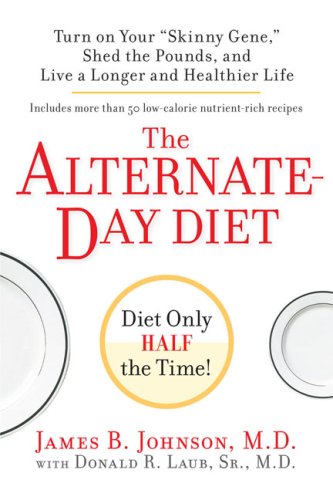As all dieters will know, there is nothing more tedious than counting calories or weighing foods for a meal plan. Especially if you then don’t lose weight.
But there’s now an effective weight-loss regimen that is not only simple, it promises significant health benefits – from easing asthma symptoms and reducing blood sugar levels, to fending off heart disease and breast cancer and protecting brain cells. Apparently, you’ll also live longer.
The diet goes under various names – The Alternate-Day Diet, Intermittent Fasting or The Longevity Diet – but the principle is the same: eat very little one day (50 per cent of your normal intake) and as much as you like the next.
This appears to trigger a ‘skinny’ gene that encourages the body to burn fat.
Researchers first discovered the benefits of low-calorie eating in the Thirties. They found that putting a rat – or a worm, or a fruit fly or just about any animal, as it turned out – on a permanent very low calorie diet helped the animal live about 30 per cent longer than normal.
The animal had clearer arteries, lower levels of inflammation, better blood sugar control and its brain cells were less likely to get damaged. Meanwhile, rates of diseases linked to ageing all dropped.
 Fasting and Eating for...
Best Price: $1.85
Buy New $5.21
(as of 11:00 UTC - Details)
Fasting and Eating for...
Best Price: $1.85
Buy New $5.21
(as of 11:00 UTC - Details)
But while scientists have known for years that animals on a low-calorie diet were healthier, no human – except a few iron-willed fanatics – could permanently stick to this regime.
The big breakthrough came in 2003 when Dr Mark Mattson, an American neuroscientist, discovered rats still enjoyed all those health benefits even when their calories were cut only on alternate days.
In other words, you don’t have to starve yourself all the time.
This was a crucial discovery, because the diet suddenly became a realistic option. In particular, it is far more palatable for the obese. The standard diet for them involves a daily intake of between 20 per cent and 40 per cent of what they would normally have.
‘These are very hard diets to follow,’ says Krista Varady, assistant professor of kinesiology and nutrition at the University of Illinois, Chicago.
You are constantly hungry. The eat-every-other-day-diet seems to offer an easier and more effective option.’
 The Alternate-Day Diet
Best Price: $2.82
Buy New $14.19
(as of 02:35 UTC - Details)
The Alternate-Day Diet
Best Price: $2.82
Buy New $14.19
(as of 02:35 UTC - Details)
She’s just published the results of a ten-week trial of 16 patients, all weighing more than 14st.
They ate 20 per cent of their normal intake one day and a regular, healthy diet the next. Each lost between 10lb and 30lb; much more than the 5lb or 6lb expected.
‘It takes about two weeks to adjust to the diet and, after that, people don’t feel hungry on the fast days,’ says Varady.
Dr James Johnson, author of The Alternate-Day Diet, and a lecturer in plastic surgery, has now been doing the diet for five years.
‘I’ve always been a bit overweight. When I first started, I lost 35lb in 11 weeks.
‘Now I use the diet to keep my weight stable. If it starts going up, I’ll just go back on it for a few weeks. The evidence says this is about the most healthy thing you can do for yourself.’
One specific health benefit is relieving the symptoms of asthma – and that’s not just because the patients have lost weight.
A small study of ten obese asthmatics found that after eight weeks they’d lost eight per cent of their body weight; their symptoms of the disease had also greatly improved.
The study, conducted by Dr Johnson with scientists from the National Institute on Ageing ( including Dr Mattson) and Stamford University, showed patients had less inflammation in their lungs, making it easier for them to breathe.
 The Juice Fasting Bibl...
Best Price: $1.03
Buy New $5.00
(as of 03:05 UTC - Details)
The Juice Fasting Bibl...
Best Price: $1.03
Buy New $5.00
(as of 03:05 UTC - Details)
They also had lower levels of damaging free radicals – the substances we produce simply by eating and breathing – which have been linked with heart disease and cancer.
‘The level of inflammation was down by 70 per cent and the level of free radicals by 90 per cent,’ says Dr Johnson. ‘No other dietary approach to asthma has recorded anything like that benefit.’
About two weeks after coming off the diet the patients’ symptoms began to return.
Meanwhile, British researchers are now looking at the benefits of the diet in preventing breast cancer in highrisk patients.
‘We’ve found a very low 800 calories-a- day diet dramatically lowers the enzymes that metabolise fat and glucose in breast tissue,’ says Dr Michelle Harvie, of the Genesis Breast Cancer Prevention Centre in Manchester. ‘These enzymes are always raised in breast cancer patients.’
When Dr Matteson made his discovery, it wasn’t clear exactly why very low calorie diets had such an effect on health and lifespan.
But in the past couple of years it’s emerged that a specific gene – SIRT1 – might explain the diet’s success; it seems the sudden, sharp stress of a big drop in food intake triggers this ‘skinny’ gene. ‘This then blocks another gene involved in storing fat,’ explains Dr Johnson.
November 27, 2009




